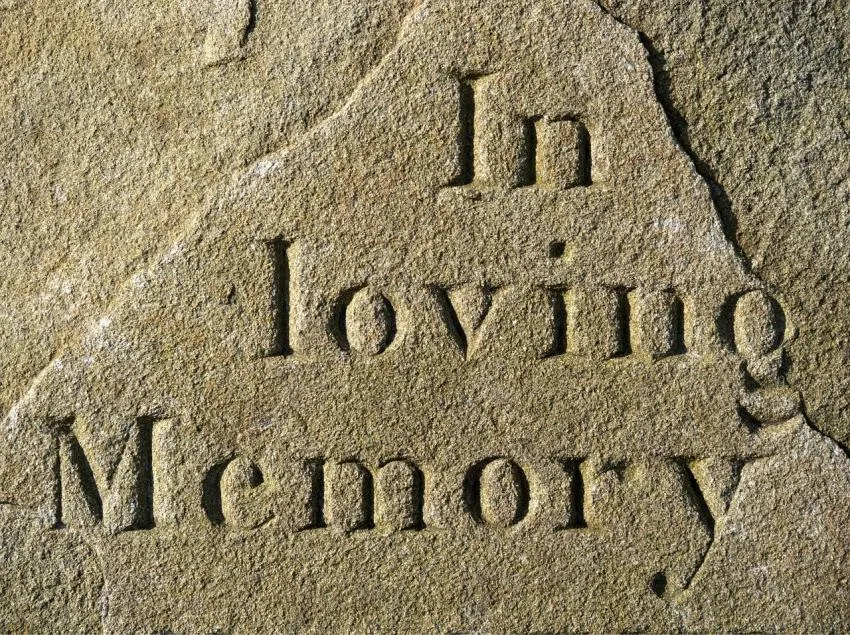Condolences: Why Are Other People Sorry My Loved One Died?

“I’m sorry for your loss.”
If it’s never been said to you, consider yourself lucky. This is the phrase a person hears over and over again as news spreads that their loved one has died. I’ve committed this faux pas from time to time. It’s been so ingrained as the thing to say when the news of someone passing reaches us that it's a reflex.
It is absolutely something I don’t want to hear when someone I love dies. All I’m thinking as the inevitable sorry passes through another person’s lips, is what are you sorry for?
I would much prefer other words of comfort and support after someone I love has kicked the bucket. Somewhere along the line, saying sorry became the norm. Well, it’s time for a different approach to comforting others when they have suffered a loss.
Why do people give condolences?
As a society, we aren’t very stoic. People love to express themselves. As things continue to evolve, people are starting to express a full range of emotions publicly. People are no longer limited to conveying traditionally “good” feelings and are free to express whatever they are feeling in the moment.
With the way technology gives us access to everything at our fingertips, we are constant digital social butterflies. Even before in-person contact was severely lacking because of the pandemic, it was becoming increasingly more common for people to share whatever might be happening in their lives publicly. Because of this, people are also being more thoughtful of and responsive to the plights of others.
This means that when someone dies, at some point, people are going to start hearing about it. It could be any type of communication sent right when it happens or later on. It could be a post to notify the masses when arrangements have been made. It could be randomly, after all the post-death hubbub has died down and grief rears its ugly head demanding a public expression.
Whenever this happens, it’s almost guaranteed to result in an immediate outpouring of support. Reaching out to someone who has suffered a loss has become compulsory – whether it be a text or call, reaction or comment on social, or even an in-person visit, we feel the need to do something before we allow the moment to pass without a response.
We have to convey to a person who is grieving that they have our support. While we may not share the same pain they are feeling, we likely have our own interpretation of what that death means. So, while the experience is their own, we show support in any way we know how, even if it’s for nothing more than to pat ourselves on the back for reaching out in that person’s time of need.
Why do we say I’m sorry when someone dies?
People can’t help it. Apologies tend to come when there is a lack of something. In the case of death, probably a lack of anything good to say. Sorry is said to even the most distant of acquaintances as if the death was, in some way, the fault of the condoler.
Unless you are the person who killed my loved one, you have no reason to be sorry.
As luck would have it, I was gifted the opportunity of standing in the receiving line as a cascade of people trudged through the funeral parlor to get a glimpse of my dead grandma. So many sorries to accept, so so many. And I just had to stand there and thank people for their sorrow. Social protocols dictated this response.
What I really wanted to respond with was “Sorry for what?”
Sorry for my bad feelings? You didn’t cause them.
Sorry for the death? Again, you didn’t cause it.
Sorry for the situation? Bad things happen to everyone.
According to research compiled by Michael S. Gazzaniga in Who’s in Charge? Free Will and the Science of the Brain, there is a neural link between observation and the imitation of an action. As humans, we have mirror neurons associated with movements all over our bodies and they fire not only to imitate physical actions but also to experience the emotions of others. We literally cannot help but feel another person’s sadness when they are experiencing grief.
As a result, we respond with condolences, and “I’m sorry” just rolls right off the tongue. It’s almost involuntary. The person who is experiencing the grief knows that while you may have an inkling of the emotions they are experiencing, you cannot know their specific grief. Being sorry is meant to come off as a show of support in a time of need, but it lands more like an empty promise. It's better to say something passive at the moment because to say nothing goes against our natural inclination towards compassion.
Should you say sorry when someone dies?
It’s hard not to because people seem to love to be sorry. The first step to breaking this impulse is to stop apologizing for everything. Somewhere humans picked up this weird habit where they instantly apologize if they are met with any type of contradiction.
The word sorry can also be used as a form of manipulation. Some people use it to create guilt for someone not responding to them in the way they prefer. Sorry is so overused, sometimes abused, it loses its value when being conveyed as a sign of support.
For me, any hard negative feelings I’m feeling get wrapped in humor. It’s how I cope. It’s not for everyone, and there are many different ways to get along. It's best to cater to the needs of the individual in their time of need. If you’re not really close enough to a person to know in what way you could show support, then should you really be using a term that comes off more like an apology?
Someone saying sorry immediately creates a debt for the person hearing it. Either you accept this offering of sorrow or you are somehow lacking in basic social etiquette. If you are not gracious in receipt of the sorry there must be something wrong with you. There is no need to give a person who is grieving another burden to bear.

What can I say instead of I’m sorry?
When the knowledge of another person’s loss hits and we inevitably reach out to acknowledge that pain, it does matter what we say. While we are all entitled to our own feelings and emotions, our message should be catered to the recipient of our condolences and not to ourselves. There are definitely some things to avoid saying and you should never make light of another person’s grief.
Remember, it’s not about you, so if you’re only reaching out to make yourself feel better, don’t. The last thing you want to do to someone who is grieving is to project your own feelings or ask prying questions about the cause of their loved one's death.
Be there for them in whatever way they need. Let them feel whatever they need to feel to process their grief. A person could need something as simple as help cleaning their house, maybe they need someone to spend the afternoon day drinking, whatever it is, cater to what they need to deal with the reality of life without their loved one.
What not to say to someone who is grieving:
- I’m so sorry.
- I’m sorry for your loss.
- I know how you are feeling.
- He/She/They are in a better place.
- You’ll get over it eventually.
- What can I do to make it better?
- Everything happens for a reason.
What to say to someone who has lost a loved one:
- I am here for you.
- I’m thinking of you.
- Sending love. (best for a text)
- I can’t imagine what you are going through.
- No words are good enough, know that I am here if you need anything.
- This sucks. / This is awful. (These might seem harsh, but if the shoe fits…)
- The hole in your heart never goes away, but hopefully, it gets smaller over time.
These lists could probably go on endlessly and these messages are subject to some individual interpretation. Next time someone shares their tragedy, do your best not to drop the reflexive I’m sorry. Try to take a minute to think and give them the thoughtful, supportive response they deserve. Help them honor the memory of their loved one in the way they see fit.

Opinions and Perspectives
I never realized how empty saying 'I'm sorry' can feel until I lost my dad last year. People meant well but it started to sound meaningless after hearing it hundreds of times.
The article really hits home about the awkwardness of receiving lines at funerals. I felt like a robot thanking people for being sorry over and over.
When my best friend lost her mom, I actually said 'this totally sucks' and gave her a hug. She later told me it was the most genuine response she received.
Interesting point about mirror neurons making us feel others' grief. That explains why we instinctively want to say something, anything, even if it's not helpful.
I appreciate the article's perspective but disagree that saying sorry is always wrong. Sometimes it's genuinely meant as sharing in someone's sorrow.
The part about humor as a coping mechanism resonates with me. My family always ends up laughing at wakes, sharing funny stories about our loved ones.
That's exactly how my family handles it too! We celebrate the person's life with laughter and stories rather than just focusing on the loss.
This really opened my eyes about how we've been conditioned to apologize for things beyond our control.
I found the suggestion about practical help meaningful. When I lost my mother, friends who helped with daily tasks made the biggest difference.
The social media aspect is spot on. I remember feeling overwhelmed by all the Facebook messages when my grandmother passed.
What stood out to me was how saying sorry creates an obligation for the grieving person to respond graciously.
I work in healthcare and we're actually trained now to avoid saying sorry for loss and instead focus on being present and supportive.
Makes me think about cultural differences in expressing condolences. In my culture, we rarely say sorry - we focus on celebrating the person's life.
I still remember how someone just sat with me in silence after my sister passed. It meant more than any words could have.
Fascinating point about how technology has changed the way we express and respond to grief. It's become so immediate and public.
The article makes a great point about not making it about yourself. I've caught myself sharing my own grief stories when trying to comfort others.
I actually find comfort in hearing 'I'm sorry.' It feels like acknowledgment of my pain, even if it's simple.
The suggested alternatives are helpful but I think tone and sincerity matter more than the exact words used.
Having lost both parents, I can say the worst responses were those trying to find silver linings or reasons for the death.



